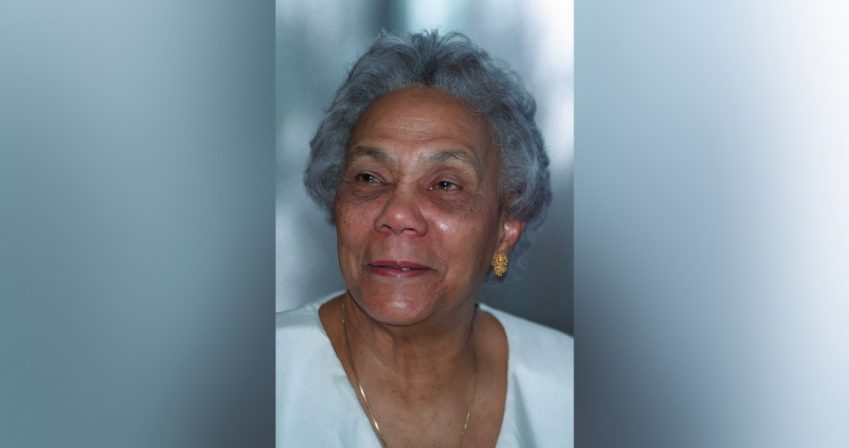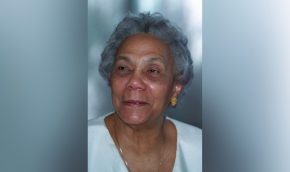First woman to be a lawyer in Dominica, and the first to be Prime Minister
Women in Law
- Introduction
- Timeline
- Joyce Bamford-Addo
- Marion Billson
- Jill Black
- Elizabeth Butler-Sloss
- Eugenia Charles
- Lynda Clark
- Freda Corbet
- Coomee Rustom Dantra
- Leeona Dorrian
- Heather Hallett
- Frene Ginwala
- Rosalyn Higgins
- Daw Phar Hmee
- Lim Beng Hong
- Dorothy Knight Dix
- Sara Lawson
- Elizabeth Lane
- Theodora Llewelyn Davies
- Gladys Ramsarran
- Lucy See
- Evelyn Sharp
- Victoria Sharp
- Ingrid Simler
- Teo Soon Kim
- Ivy Williams
- The Significance of the Sex Disqualification (Removal) Act 1919
- Podcasts
Home › Women in Law › Our Women › Eugenia Charles
Mary Eugenia Charles DBE
(1919-2005)
Admitted 1943, Called 1947
Eugenia Charles (she habitually used her second name) was born in Pointe Michel, a small fishing community not far from the Dominican capital of Roseau. Her family was prosperous: on her application to The Inner Temple, she stated her father’s occupation as 'planter-proprietor', denoting a farmer and landowner of some status. She was educated at the Dominican Convent High School- the only one on the island. Her interest in law was sparked when, on leaving school, she began attending the local magistrates’ court to practise her shorthand. Law seemed to her a more attractive career than secretarial work, and so she enrolled on a law course at the University of Toronto. She continued her education at the London School of Economics and became a member of The Inner Temple in 1943. After her Call to the Bar in November 1947, she returned to Dominica and established her own practice, specialising in property law.
On her return to her home country, Charles also became politically active, writing anonymous newspaper articles against the government of the day. Her political activity became more overt around 1968 when she got involved with protesting against the Sedition Act, with which the Dominican government was attempting to stifle its political critics. The protests were successful, and 'Shut Your Mouth Bill', as Charles referred to it, was withdrawn. The following year, she co-founded the Dominica Freedom Party (DFP) and was elected its President. The party came second in the general elections of 1970, winning 38% of the vote and two of the eleven seats in the House of Assembly. One of these seats, Roseau Central, was Charles’.


Dame Eugenia Charles Prime Minister of Dominica 27 October 1993 (Allstar Picture Library / Alamy Stock Photo)
As its name suggests, the Dominica Freedom Party was strongly in favour of Dominica’s independence from Britain and took a large share of the credit when this goal was achieved in 1978. The success of the independence campaign was in turn a contributing factor in the DFP’s victory in the general election of 1980, which put Eugenia Charles into the Prime Minister’s office. Another major factor was the unpopularity of the incumbent Labour government whose leader, Prime Minister Patrick John, had been forced to step down the previous year by widespread protests against new legislation to curb trade unions and the press.
Charles’ first years as Prime Minister were challenging in the extreme: Hurricane David had devastated the island’s economy and infrastructure the year before her election, and the year after it she faced two attempted coups. The first coup codenamed “Operation Red Dog” by the conspirators, was led by American and Canadian white supremacists and aimed to return Patrick John to power. The second was led by Frederick Newton, the chief of Dominica’s military forces. Both coups failed: Patrick John and the “Red Dog” conspirators served prison terms in Dominica and the US, and Newton was executed.
These experiences may in part have influenced her to support the American invasion of Grenada in 1983 in response to a coup d’état there. Her position was unusual, even controversial - the UN General Assembly voted by 108 to 9 to adopt a resolution deploring the intervention - but it did not dent her popularity at home, where she was affectionately nicknamed “Mamo Charles”. Her energy and uncompromising attitude gained her the sobriquet of “Iron Lady of the Caribbean”. She was successful in lobbying for aid money and oversaw improvements in Dominica’s infrastructure and living standards.
The DFP won the next two elections, though by 1990 its majority was reduced to a single seat. Charles herself had come to be seen by many as arrogant, distant and somewhat authoritarian. Her obituarist in the Guardian wrote:
...she ruled the island in the manner of a head teacher of a staid girls’ school, where good manners, hard work and godliness counted for more than vision, experiment and community.
Charles was appointed a Dame of the British Empire in 1991 and retired from politics in 1995, just before the general elections which her party would go on to lose. She did some work for the Carter Center, a human rights NGO set up by former US President Jimmy Carter and took on speaking engagements in various countries. Mostly, though, she stayed in Dominica where, like the other Iron Lady of the era, she commented periodically and generally caustically on the activities of her successors. She died, aged 86, of a pulmonary embolism.